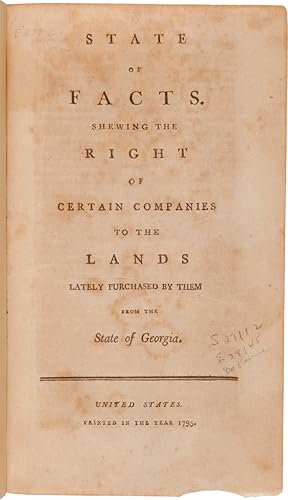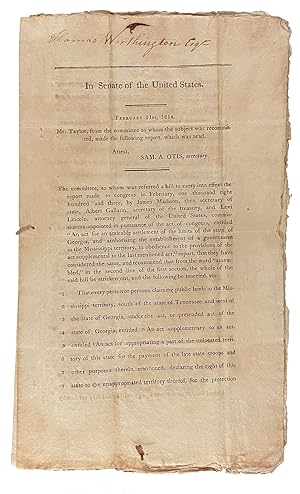Yazoo Land Fraud (2 results)
Product Type
- All Product Types
- Books (2)
- Magazines & Periodicals
- Comics
- Sheet Music
- Art, Prints & Posters
- Photographs
- Maps
-
Manuscripts &
Paper Collectibles
Condition
- All Conditions
- New
- Used
Binding
- All Bindings
- Hardcover
- Softcover
Collectible Attributes
- First Edition
- Signed
- Dust Jacket
- Seller-Supplied Images
- Not Printed On Demand
Free Shipping
Seller Location
Seller Rating
-
STATE OF FACTS. SHEWING THE RIGHT OF CERTAIN COMPANIES TO THE LANDS LATELY PURCHASED BY THEM FROM THE STATE OF GEORGIA
Published by United States [Hartford], 1795
Seller: William Reese Company - Americana, New Haven, CT, U.S.A.
64pp. Modern brown cloth, gilt leather label. Tanned, scattered foxing, contemporary marginal notes and underlining in ink. Very good. One of the pamphlets relating to the Yazoo Land Fraud. The controversy was a result of the granting of lands by the state of Georgia in the area of present-day Alabama and Mississippi, touching on the course of the Yazoo River. This pamphlet was issued by the Georgia-Mississippi Company to defend their rights to the lands they were offering for sale in Georgia, Alabama, and Mississippi. The lands were granted to the Company by the Georgia legislature after extensive bribes changed hands, and the case quickly became a major scandal. Georgia rescinded the grant the following year, but in 1810 the Marshall Court declared the Rescinding Act unconstitutional, and in 1814 five million dollars were allocated to repay the original purchasers of the land. According to Everett Wilkie, this was printed in Hartford, not Philadelphia as stated in Evans. HOWES G126, "aa." EVANS 28745. STREETER SALE 1158. DE RENNE I, p.270. VAIL 1027. COHEN 7867. SABIN 27112. DAH V, p.503. REESE, FEDERAL HUNDRED 51.
-
In the Senate of the United States.In Pursuance of the Act of Congress Entitled An Act for an Amicable Settlement of the Limits of the State of Georgia, and Authorizing the Establishment of a Government in the Mississippi Territory.
Published by Washington, D.C., 1814
Seller: Donald A. Heald Rare Books (ABAA), New York, NY, U.S.A.
Folio, uncut. (13 1/2 x 8 inches). 9pp. Gathered signatures, stab stitched. Ink ownership signature of "Thomas Worthington, Esq." at top of first page. A Senate slip-bill printing of language eventually included in the final act of the United States Congress governing the Yazoo land scandal. The first time in American History that a Federal Court had overridden a state law. In 1795, the Georgia legislature granted much of the land in the present state of Alabama to four land companies, which in turn sold shares to numerous investors all over the country; however, charges of bribery were raised and the grant was rescinded the following year. This left the investors high and dry, and many of them sued Georgia to prevent the rescinding of the sale which had made their investments worthless. The State of Georgia tried to void the fraud-induced sales, but in 1810 the United States Supreme Court ruled in Fetcher v. Peck that the voiding of the sales was unconstitutional, the first time in American history that the Federal Court had overridden a State Law. Finally, in 1814, the federal government took over the lands and paid off the claims. The present work is concerned with paying off those claims. By 1814, the Federal Government took charge of the claims involved in the Yazoo land scandal, in order to settle the issue once and for all. The proposed legislation here amends the 1803 Act of Cession, and was issued as a committee report by Senator John Taylor of South Carolina, who submitted it to the Secretary of the Senate, Samuel A. Otis on February 21, 1814. The language here acts much like a modern-day class action lawsuit. The first section calls for all claimants to Yazoo lands to report claims by a given date. The second section establishes a board of commissioners to examine the claims. The present slip-bill belonged to Thomas Worthington, who signed his name at the top of the first page. Worthington was at this time serving his second term as a United States Senator from Ohio. He would resign from the Senate later this same year, on December 1, 1814, after being elected Governor of Ohio. The work here includes a handful of ink emendations, including a couple of dates written in ink in Section 2. These were presumably added by Worthington as he consulted with his colleagues in the Senate on the legislation. The slip bill is docketed on the verso of the final leaf, "Bill on Yazoo," presumably in Worthington's hand. Shaw and Shoemaker list two pieces of slightly-earlier legislation relating to the same act, both of which are held by institutions listing them in OCLC. The present document is not listed in OCLC, and likely only survived in the hands of Senate committee members, like the present copy.



